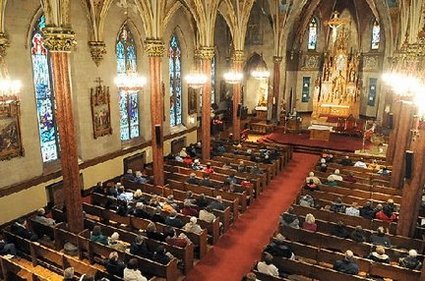 Leave it to Msgr. Charles Pope, in the Archdiocese of Washington, to frame the ongoing story of parish closings in a way we rarely consider it:
Leave it to Msgr. Charles Pope, in the Archdiocese of Washington, to frame the ongoing story of parish closings in a way we rarely consider it:
One of my own frustrations with the closing of large numbers of parishes is that we do not do a better job of using these situations as a teaching moment. The usual approach is for media, secular and Catholic is to interview grief-stricken members of a closing parish and to ask them how they feel. Well, of course, they feel awful. Some are also angry at the diocese in question, and the bishop. The usual goal of these sorts of interviews is for us to feel bad with them. And there is much to regret. Some very old parishes with wonderful histories and beautiful buildings are being lost in large numbers.
But where is the assertive teaching about the need for evangelization, summoning fallen away catholics back to the sacraments, increased family size, and so forth? The “ain’t it awful” attitude doesn’t get us very far. We have some serious repenting to do as Catholics. It is so easy to blame “mean” bishops, arrogant chancery offices and so forth. Surely there is some blame to be had in these areas. But in the end this is about the numbers of the faithful. It is simple to say the priests should do something, but it is also a fact that shepherds don’t have sheep; sheep have sheep. And it is a simple fact that the sheep are not in the fold. Every survey agrees, only 27 – 30% of Catholics even bother to go to mass any more, much less support their parishes financially. We simply cannot continue to maintain our parishes and other entities with this decline of people in the pews. The faith has largely been set aside by most Catholics who still expect their parish to “be there” at important moments like wedding and funerals, baptisms and crises.
